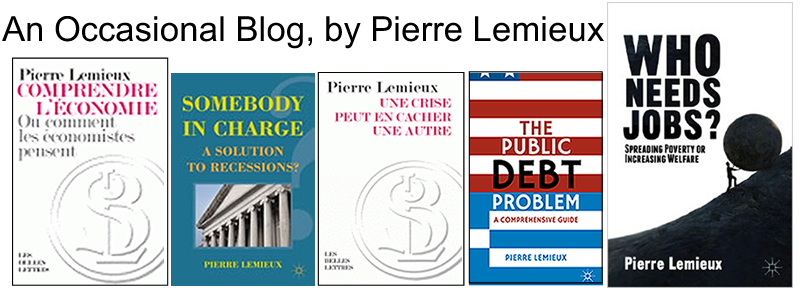Obamacare and the NSA’s total surveillance dreams hit a bump for the same reasons. In both cases, the federal government chose to, or had to, work with private companies: private insurers in one case, contractors in the other. Continue reading
Tyler Cowen and GDP
There are a few points I find problematic in Tyler Cowen’s interesting book review in the Washington Post of February 21. Warning: I have not read the books reviewed, so I reserve the right to change my opinion. I agree with nearly everything Cowen says, but I have a few main points of disagreement. Continue reading
Urban Legends about Mathematics and Keynes
Many urban legends circulate about the use of mathematics in economics.
For example, many people think (they have heard that…they know somebody who knew somebody who knew…) that John Maynard Keynes loved and used mathematics. In his 1936 magnum opus, The General Theory of Employment, Interest and Money, Keynes seldom used math. He even attacked economists for using them too much. One can find this by simply reading the General Theory:
It is a great fault of symbolic pseudo-mathematical methods of formalizing a system of economic analysis… Continue reading
The State Must Have Something to Hide
Any terrorist who does not believe that we are living in a free society but under a disguised tyranny (the sort he would like to establish under a different mantle) would have assumed that, at the very least, his phone calls could be logged and his emails read. The only people not to believe so were honest citizens who thought they were living in a free society. So remind me what are the reasons for hiding the Surveillance State? Why do you hide your surveillance programs if you have nothing to hide?
US Government Is Already Broke
Published in the Financial Post (www.nationalpost.com), January 25, 2013
In Tuesday’s Financial Times, well-known columnist Martin Wolf argues that “America’s fiscal policy is not in crisis.” “The federal government,” he writes,“is not on the verge of bankruptcy.” “This,” Wolf admits, “is a highly controversial statement.”
Indeed, many analysts believe that the U.S. federal government is bankrupt. They include, among others, economists Jeffrey Hummel of San Jose State University and Laurence Kotlikoff of Boston University. As early as 2006, Kotlikoff wrote an article in the journal of the Federal Reserve Bank of St. Louis, asking the question “Is the United States Bankrupt,” to which he answered affirmatively. Continue reading
Obama’s Inaugural Address: the Citizens’ Citizens
Presidential inaugurations are, at best, similar to royal marriages in England, where simple people dream of the Prince Charming; at worst, they resemble nationalist orgies where people proclaim their faith in, and submission to, their dear leader. There was both in Barack Obama’s inauguration today. Continue reading
James Buchanan (1919-2013)
Published in the Financial Post (www.nationalpost.com), January 10, 2013 [Note that the copy editor mistakenly removed the quote marks around “politics without romance,” which is an Buchanan’s expression.]
If one expression can capture the work of James Buchanan, who died yesterday aged 93, it is “politics without romance.” His approach generated a whole school of economic analysis called “Public Choice.” Closely associated to Buchanan were Gordon Tullock, Richard Wagner, Geoffrey Brennan, and other economists working mainly at the Virginia Polytechnic Institute and, later, George Mason University.
For his work in this field, Buchanan won the 1986 Nobel Prize in Economic Sciences.
Buchanan’s starting point was so simple enough that it now seems rather obvious. Continue reading
The Price of Gold
At the end of November, Goldman Sachs predicted a short-term (over a three-month horizon) increase in the price of gold, followed by a downward trend through 2014. Accompanied by a new, bullish outlook for the American economy, this bearish forecast for gold made the financial news (see for example the Financial Times of December 7, 2012). Since then, the price of gold has been trending downwards, but things could change.
This sort of forecast raises interesting questions on the factors that influence the price of the yellow metal. Continue reading
Beyond Madoff ’s Wildest Dreams
That’s how American politicians and bureaucrats are dreaming. In the current issue of Regulation, see my review of Laurence J. Kotlikoff and Scott Burns, The Clash of Generations (MIT Press, 2012).
My book on the same topic, The Public Debt Problem: A Comprehensive Guide (Palgrave Macmillan, 2013) will be out in a few days.
How China Became Capitalist
See my review of Ronald Coase and Ning Wang’s recent book in the current issue of Regulation.
